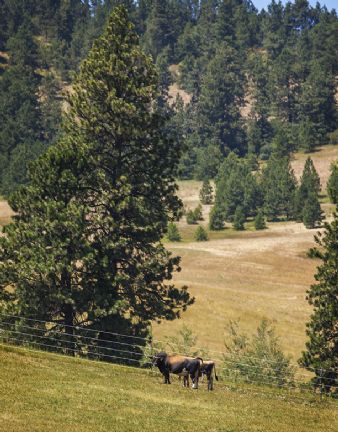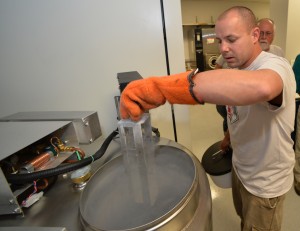| Author |
Topic |
|
|
maryjane
    
7076 Posts
|
 Posted - Aug 04 2016 : 06:47:46 AM Posted - Aug 04 2016 : 06:47:46 AM


|
It's one thing to collect Jersey bull semen. (Lots of jokes about people calling here for semen.)

It's another thing to collect bee semen.
Importing frozen honey bee sperm is key to conservation
PULLMAN, Wash. – Going through customs can be frustrating for travelers. Imagine going through with a container of frozen bee sperm.
“It’s certainly a challenge,” said Brandon Hopkins, Washington State University entomology research associate and lab manager of the WSU Apiary Program. “Most customs agents aren’t used to seeing that, so it takes a lot of explaining.”
It’s complicated by the fact that WSU has the only permit issued by the U.S. Department of Agriculture (USDA) to import honey bee semen into the U.S.
Honey bees are not native to North or South America, and importing into the U.S. has been tightly restricted since the 1920s. As a result, U.S. honey bees have limited genetic diversity.
“We’re importing germplasm from Old World populations around Europe to increase genetic diversity here,” Hopkins said. “The goal is to improve commercial breeding for bees so they can better fight off diseases and parasites.
“Everything we do in this effort is to ensure bees survive to pollinate our food sources,” he said.
Hopkins and other WSU entomologists have collected genetic material in Italy, Slovenia, the Republic of Georgia and Kazakhstan since they received a USDA permit to import honey bee semen in 2008.
Freezing bee semen
WSU scientists also transport fresh sperm, but its shelf life is only about two weeks. Hopkins developed a method for freezing the material as part of his master’s degree at Eastern Washington University, and he refined it further when he came to WSU to earn his Ph.D.
“Cryogenic freezing has been used to preserve germplasm from animals like cattle for decades,” he said. “I adapted it for honey bees. Right now we are the only repository for bee germplasm in the world.”
The importation process starts with a trip to collect material overseas. Once WSU scientists arrive in a country, they work with local beekeepers or government agencies equivalent to the USDA to visit a variety of hives.
“We try to collect hundreds of microliters of sperm every day we’re there, so those are long days,” Hopkins said. They collect mature male bees, called drones, and then extract semen. Each male produces about one microliter. For comparison, a single drop of water is approximately 100 microliters.
The semen is frozen in the origin country because freezing fresh material yields the best results. A special substance is added to avoid damaging the cells during freezing. Once back at WSU, the samples are stored at -196°C (-320°F) in a tank of liquid nitrogen.
Theoretically, the sperm can stay viable at that temperature for 10,000 years or more, Hopkins said. It can then be thawed out and used to breed honey bees here.
Ensuring genetic improvement
Unfortunately, the breeding process is not as simple as inseminating one queen and then providing the second generation of bees to breeders. Second generation queens contain only 50 percent of the imported European DNA.
If those queens are released, the imported genes would quickly become diluted as they breed with U.S. bees. To prevent genetic dilution, Hopkins and WSU researchers inseminate second generation queens with imported material as well, ensuring that third generation bees have 75 percent imported DNA. Then that generation of bees is inseminated as well. The iterative process results in dozens of queens with more than 85 percent of imported genetic material.
These multiple rounds of insemination are where the frozen semen is most helpful.
“Without frozen semen, this process would require trips back to Europe every year or multiple times per year,” Hopkins said. “With frozen semen, we simply thaw the semen to use for each generation.”
The genetically diverse bees are provided to U.S. bee breeders to breed future generations that are adapted for certain geographic regions.
“We want to improve the genetic background of honey bees so they can fight off diseases and be more likely to survive in their climates,” Hopkins said.
Honey bee conservation
Beyond increasing disease resistance, the cryogenic program has a conservation component. A few countries and regions are interested in preserving the genetic material of their distinct bee varieties.
“You can’t put a fence around bees,” Hopkins said. “So in Italy and France and other locations, they’re trying to conserve their unique subspecies. Freezing semen conserves those specific genetic lines or entire subspecies inexpensively for a long time.”

He said the WSU bee program has worked with researchers from around the world to create more honey bee genetic repositories like the one at WSU. With the potential of a new Honey Bee & Pollinator Research Facility established at WSU, Hopkins said the university will be able to do even more research to diversify the gene pool for U.S. honey bees.
“We’re still really early in studying this,” he said. “But we’re learning more every day, and that center will be a huge boost to our program and the body of knowledge about saving the honey bees here.”
To learn more, visit http://bees.wsu.edu/.
|
MaryJane Butters, author of Milk Cow Kitchen ~ striving for the stoicism of a cow standing in the rain ~ |
|
|
NellieBelle
    
11220 Posts
|
 Posted - Aug 04 2016 : 09:17:35 AM Posted - Aug 04 2016 : 09:17:35 AM


|
Good morning MaryJane! Beautiful pastoral with the bulls. I will admit that science does amazing things, but I'm really wondering if like "too much government" there is "too much science." It concerns me that we are too eager to jump in and mess with what was created. Too eager to alter things when things start going wrong, and not allowing things to adjust or adapt to original being. I probably don't make sense, but I'm alarmed at all the genetically modified everything. We have altered the planet so much, chemicals, pollution, it's so sick that everything on it is ill. Why not get rid of all the chemicals that are knowingly harmful to humans, honeybees, all living things and let them recover through the years. A reversal of sorts. Never happen. But that's what I would rather see take place. It is truly outstanding what science is able to accomplish. Genetically modified crops, food, and now honeybees too. Will we keep messing with all animals that develop problems and genetically modify them so that they can survive diseases and problems we've created? :( Sad it has to come to this. Thanks for the article, great forage to chew on. :) I think I need more Craven's.
|
To laugh is human but to moo is bovine. Author Unknown |
 |
|
|
maryjane
    
7076 Posts
|
 Posted - Aug 04 2016 : 09:22:02 AM Posted - Aug 04 2016 : 09:22:02 AM


|
| I know exactly what you mean. Apparently, jelly fish are a problem now. There are too many of them so an increasing number of beaches are no longer safe for swimmers, including those in the Puget Sound. That's because jelly fish thrive in polluted waters. A woman who is studying them said, "There is a shortage of jelly fish scientists." |
MaryJane Butters, author of Milk Cow Kitchen ~ striving for the stoicism of a cow standing in the rain ~ |
 |
|
|
txbikergirl
    
3197 Posts
|
 Posted - Aug 04 2016 : 1:13:49 PM Posted - Aug 04 2016 : 1:13:49 PM


|
well this gave me a good laugh out loud. bee semen, who would have thunk it.
i am with janet. back to basics. not a luddite, but we can only mess with the basic foundations so much without making everything that is built upon it fall. |
_(199x300)_(66x100).jpg?v 93697001) Firefly Hollow Farm , our little farmstead. Farmgirl living in the green piney woods of East Texas on 23 acres with a few jerseys, too many chickens, a pair of pugs and my Texan hubby (aka "lover boy") Firefly Hollow Farm , our little farmstead. Farmgirl living in the green piney woods of East Texas on 23 acres with a few jerseys, too many chickens, a pair of pugs and my Texan hubby (aka "lover boy") |
 |
|
|
CloversMum
    
3486 Posts
|
 Posted - Aug 04 2016 : 5:09:44 PM Posted - Aug 04 2016 : 5:09:44 PM


|
| Agreed Janet and Cindy. |
Loving life and family on our Idaho farm, Meadowlark Heritage Farm; A few Jersey cows; a few alpacas; a few more goats, and even more ducks and chickens |
 |
|
|
GingerBKelly
 
274 Posts
|
 Posted - Sep 26 2016 : 08:45:35 AM Posted - Sep 26 2016 : 08:45:35 AM


|
| Well, why not? We use bull seaman, why not honey bee seaman? We have an apiary (hence the name, Kelly Homestead Apiary), but we raise bees the old fashion way. If we were raising queens, I'd certainly think about this, if it was affordable and available to the general public. As a general rule, queens mating is a hit or miss process. We hope and pray a queen was mated properly, doing things the old fashion way. Sometimes she isn't. I wonder how this will affect the entire process of mating and re-queening for our future apiarist (beekeepers)? Very interesting topic. Thanks for sharing. |
~Ginger Kelly, Kelly Homestead Apiary, Charlton, MA~.jpg?v 26652890) gingerbkelly@gmail.com gingerbkelly@gmail.comWhen a cow laughs, does milk come out her nose? ~Author Unknown
Check us out on FB: https://www.facebook.com/KellyHomesteadApiary/ |
 |
|
| |
Topic |
|
|
|
![[flourish]](/images/flourish-txt_mobius.png)
![[flourish]](/images/flourish-txt_mobius.png)